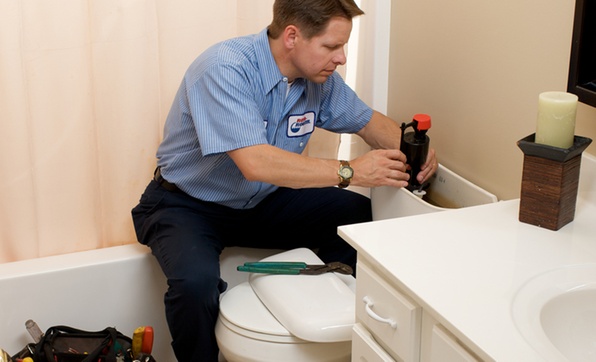Bathroom Plumbing Basics: Essential Advice for New Homeowners
Bathroom Plumbing Basics: Essential Advice for New Homeowners
Blog Article
What are your thoughts with regards to Plumbing Tips for New Homeowners?

For new home owners, understanding and maintaining shower room pipes can conserve both money and time by preventing pricey problems down the line. Below are some vital restroom plumbing suggestions to help you maintain whatever running smoothly.
Familiarize Yourself with the Key Shut-Off Valve
Knowing where the primary water shut-off valve lies in your home is vital. This allows you to promptly shut off the water supply in case of major leakages or throughout pipes emergency situations, stopping substantial water damages.
On A Regular Basis Examine for Leakages
Small leakages can result in large issues. Frequently inspect under sinks, around bathrooms, and near pipes fixtures for any type of signs of leaks. Seek moisture, small drips, or corrosion. Capturing and fixing leaks early can avoid a lot more severe damages and conserve water.
Don't Disregard Slow Drains
If your sink or bathtub is draining slowly, it's often an indicator of a clog developing. Addressing this early can stop a total clog. Make use of a plunger or a plumber's serpent to remove debris. Stay clear of utilizing chemical drain cleaners as they can damage your pipes gradually.
Know What Not to Flush
Toilets are not garbage disposals. Stay clear of purging anything aside from bathroom tissue and human waste. Products like wipes, womanly hygiene items, and cotton bud ought to be disposed of in the garbage to stop blockages and drain back-ups.
Install Strainers in Drains
Place strainers in your sink and bathtub drains to capture hair and various other particles prior to they enter your pipes system. Cleansing the filters regularly will help avoid build-up and keep water moving freely.
Maintain Your Hot Water Heater
Guarantee your water heater is readied to an ideal temperature (typically around 120 levels Fahrenheit) to stop hot and minimize energy use. Flush the storage tank annually to eliminate debris buildup, which can minimize the performance and life-span of your heating unit.
Upgrade Your Components
If your home has older fixtures, consider updating to extra reliable versions. Modern toilets, showerheads, and faucets are developed to utilize much less water while offering great pressure, which can dramatically minimize your water bill and ecological footprint.
Be Cautious with Do It Yourself Pipes Services
While it's appealing to take care of all home repair services on your own, beware with plumbing. Some concerns may require specialist know-how, especially if they entail major water lines or sewer repairs. Employing a specialist can sometimes be more cost-efficient than DIY, specifically if it stops additional damages.
Get Ready For Winter
Shield your pipes from freezing throughout cold weather by shielding pipes in unheated locations like basements, attics, and garages. Throughout extreme chilly, let cold water drip from taps offered by exposed pipes to assist avoid cold.
Schedule Normal Upkeep
Think about scheduling yearly evaluations with an accredited plumbing professional. They can detect issues that you might miss out on, such as surprise leaks or damage on pipelines and fixtures. Routine upkeep aids extend the life of your plumbing system and can stop emergency situations.
Verdict
Understanding and maintaining your home's bathroom pipes can protect against numerous typical problems. By following these necessary suggestions, you can ensure your shower room remains practical and efficient, saving you time and money in the long run.
Essential Plumbing Tips for Homeowners: Keep Your Pipes Flowing Smoothly
As a homeowner, understanding the basics of your plumbing system can save you time, money, and a lot of headaches. Plumbing issues can range from minor annoyances like dripping faucets to major problems like burst pipes that cause significant damage. This guide provides essential tips to help you maintain your plumbing system and tackle common issues.
Understanding Your Plumbing System
Supply System: Brings fresh water into your home from a municipal source or a well. Drain-Waste-Vent System: Removes wastewater and vents sewer gases outside. Fixtures and Appliances: Includes sinks, toilets, showers, dishwashers, and washing machines. Basic Maintenance Tips
Regular Inspections: Periodically check for leaks, corrosion, and other signs of wear and tear. Look under sinks, around toilets, and near water heaters. Know Your Main Shut-Off Valve: In case of a major leak, you’ll need to shut off the water quickly. Ensure everyone in your household knows where the main shut-off valve is located. Prevent Frozen Pipes: In cold climates, insulate exposed pipes and let faucets drip during extreme cold to prevent freezing. Use Strainers: Install strainers in sinks and tubs to catch hair, food particles, and other debris that can cause clogs. Common Plumbing Issues and Solutions
Clogged Drains:
Prevention: Avoid pouring grease down the drain and use drain screens to catch debris. DIY Fix: Use a plunger or a plumbing snake to clear minor clogs. For stubborn clogs, a mixture of baking soda and vinegar can sometimes help. Leaky Faucets:
Prevention: Replace washers and seals regularly. DIY Fix: Turn off the water supply, disassemble the faucet, and replace worn parts.

Click Here Report this page